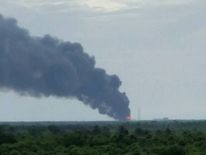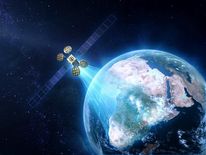Mark Zuckerberg says he is “deeply disappointed” after a satellite backed by the social network was destroyed in an explosion.
An unmanned SpaceX rocket has exploded during a routine test at Cape Canaveral in Florida.
The Falcon 9 rocket and its $200m (£150m) satellite payload were destroyed in the blast, which happened while the rocket was being test-fired just after 1pm.
SpaceX said no-one was injured and blamed an “anomaly” on the launchpad for the explosion.
It added that the fault occurred “during propellant loading of the vehicle”.
The Israeli AMOS-6 satellite destroyed in the blast was set to be part of a Facebook scheme to provide internet coverage to parts of Sub-Saharan Africa.
In a statement the social network’s CEO Mark Zuckerberg said he was “deeply disappointed”.

The explosion happened at about 9am local time Pic: Mary Micolites
Mr Zuckerberg added: “We remain committed to our mission of connecting everyone, and we will keep working until everyone has the opportunities this satellite would have provided.”
Elon Musk’s SpaceX had been due to launch the rocket at dawn on Saturday.
The force of the explosion shook buildings several miles away, and a thick cloud of smoke was seen rising from the launch site near NASA’s Kennedy Space Centre.
Footage taken after the blast showed the rocket still standing, although the top third of the Falcon 9 appeared to be bent over.
The air is being monitored by authorities for any sign of toxic fumes.
SpaceX is one of two companies shipping supplies to the International Space Station for NASA.

Mark Zuckerberg announced the AMOS-6 Africa project in October 2015
The blast occurred as two astronauts carried out a spacewalk outside the ISS to fix a thermal radiator.
The astronauts were not informed of the explosion, NASA said.
The accident is expected to significantly disrupt the SpaceX’s plans for six planned launches between now and January 2017.
It comes just over a year after a Falcon 9 rocket failed just after liftoff, destroying a Dragon cargo capsule bound for the ISS.
SpaceX has also lost several rockets while attempting land them upright on ocean platforms.
However it successfully landed a Falcon 9 on a floating drone ship last month, after the rocket sent a Japanese communications satellite into orbit.